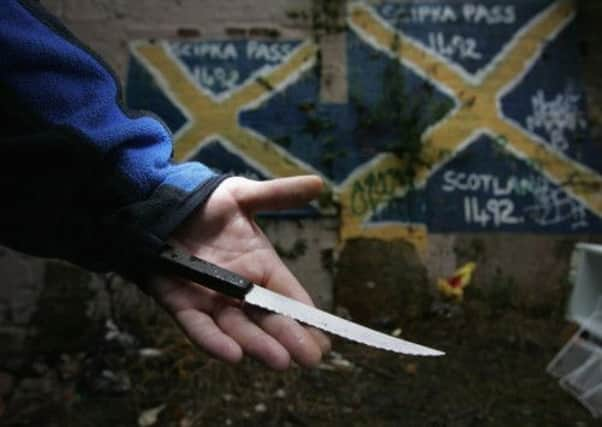Glasgow knife crime falls by a third


There were 903 assaults involving blades in the period 2012-2013, compared with 1,439 the year before, a fall of 37 per cent. The rate is down 57 per cent since 2006-2007, when 2,138 knife attacks were recorded in the city.
Officers have attributed the fall in knife crime to an increase in stop and search procedures across Glasgow. In November, 2007 the number of such searches carried out in the city was 4,356. Five years on, this figure has risen to 26,669.
Advertisement
Hide AdAdvertisement
Hide AdThe increased use of stop and search brought an initial spike in recorded knife possession, but the figure has fallen from 1,304 in 2006-2007 to 578 in 2012-13.
Welcoming the fall, Chief Superintendent Andy Bates, the police commander for the new Greater Glasgow division, said: “I think the stop and search activity, combined with the general activity and increased visibility of police on the streets has had an absolutely significant impact on it, and in my opinion it’s probably the number one factor.
“But also built into that are the various other initiatives, the ‘No Knives, Better Lives’ campaign run by the council and other partner agencies. It’s about amending people’s behaviour, and it’s about them being worried about carrying a knife on the street, not just because of the damage it might cause but because they might get caught.”
Mr Bates said there was still some way to go in reducing knife crime and addressing the city’s association with the offence. But he said the goal was to reach a point where Glasgow no longer stood out from other Scottish cities for knife crime.
Earlier this year the city was ranked as the UK’s most violent area by the Institute for Economics and Peace (IEP), which identified the continuing problem of knife crime and gangs as contributing significantly to Glasgow’s high rating.
The figures for the Greater Glasgow area were obtained through Freedom of Information, and a spokeswoman for Police Scotland said that knife crime figures for the rest of Scotland were not available yet.
Scottish Government crime statistics for “handling an offensive weapon”, though not directly comparable to Glasgow’s knife figures, show that, during 2012/13, Lothian & Borders police recorded 685 offences, Grampian 260, and Central 226. Strathclyde, including Glasgow, saw 2,182 offences.
The stop-search policy has now been rolled out across Scotland. But its use has been criticised by human rights groups who see the policy as an infringement of personal liberty.
Advertisement
Hide AdAdvertisement
Hide AdHuman rights lawyer, Tony Kelly said he did not necessarily see a direct link between the policy and the reduction in numbers. “The reduction of knife crime can be to do with a number of things – socio-economic things – and I’m sure the courts would like to take their fair-share of credit for that as well, in relation to the stiffening of sentencing policy,” he said.
Comment: Zeitgeist confirms a shift away from violence but much more needs done
VIOLENCE is the essence of a wicked problem. It is a complex, complicated issue, and no one simple solution will solve it, and so it is with knife crime.
I believe the drop in knife carrying should be celebrated – but cautiously. The police are doing great work to help drive down levels of violence and knife carrying, but as any A&E nurse will tell you, crime figures do not tell the whole story – a litany of injured present themselves at our hospitals without any crime report being made, relying on the huge skills of our surgeons to save them.
I speak to many people whose lives have been changed forever by the actions of a knife carrier. What is helping is the zeitgeist that has occurred which has seen people commit to challenging a problem which has blighted Scotland for so long.
I’m thinking of Medics Against Violence, medical professionals who give up their free time to educate young people about keeping themselves safe, parents who have become more aware of the issues, communities striving to make a change in their local area, and successive governments maintaining their commitment to making Scotland safe.
I’m privileged to work in this field and am endlessly impressed with local people making a difference. We have treated violence and knife carrying as public health issues in Scotland for the last ten years – focusing on prolonging life and promoting health through the organised efforts of society, organisations, public and private, communities and individuals.
I believe we are moving in the right direction, yet there are many families whose lives are still being affected, who don’t feel safe and who want us to do more – and we must.
• Karyn McCluskey is director of the Violence Reduction Unit.
SEE ALSO